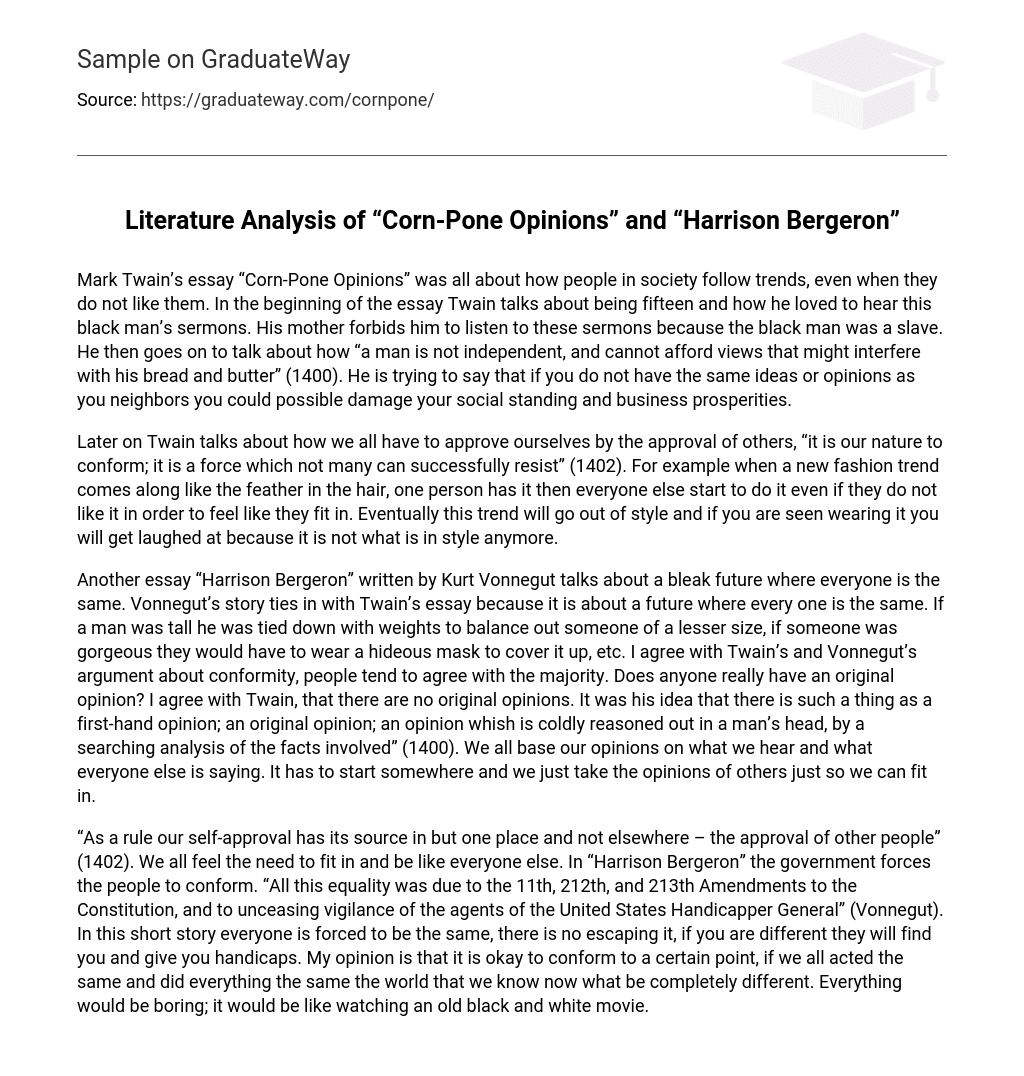Mark Twain’s essay “Corn-Pone Opinions” was all about how people in society follow trends, even when they do not like them. In the beginning of the essay Twain talks about being fifteen and how he loved to hear this black man’s sermons. His mother forbids him to listen to these sermons because the black man was a slave. He then goes on to talk about how “a man is not independent, and cannot afford views that might interfere with his bread and butter” (1400). He is trying to say that if you do not have the same ideas or opinions as you neighbors you could possible damage your social standing and business prosperities.
Later on Twain talks about how we all have to approve ourselves by the approval of others, “it is our nature to conform; it is a force which not many can successfully resist” (1402). For example when a new fashion trend comes along like the feather in the hair, one person has it then everyone else start to do it even if they do not like it in order to feel like they fit in. Eventually this trend will go out of style and if you are seen wearing it you will get laughed at because it is not what is in style anymore.
Another essay “Harrison Bergeron” written by Kurt Vonnegut talks about a bleak future where everyone is the same. Vonnegut’s story ties in with Twain’s essay because it is about a future where every one is the same. If a man was tall he was tied down with weights to balance out someone of a lesser size, if someone was gorgeous they would have to wear a hideous mask to cover it up, etc. I agree with Twain’s and Vonnegut’s argument about conformity, people tend to agree with the majority. Does anyone really have an original opinion? I agree with Twain, that there are no original opinions. It was his idea that there is such a thing as a first-hand opinion; an original opinion; an opinion whish is coldly reasoned out in a man’s head, by a searching analysis of the facts involved” (1400). We all base our opinions on what we hear and what everyone else is saying. It has to start somewhere and we just take the opinions of others just so we can fit in.
“As a rule our self-approval has its source in but one place and not elsewhere – the approval of other people” (1402). We all feel the need to fit in and be like everyone else. In “Harrison Bergeron” the government forces the people to conform. “All this equality was due to the 11th, 212th, and 213th Amendments to the Constitution, and to unceasing vigilance of the agents of the United States Handicapper General” (Vonnegut). In this short story everyone is forced to be the same, there is no escaping it, if you are different they will find you and give you handicaps. My opinion is that it is okay to conform to a certain point, if we all acted the same and did everything the same the world that we know now what be completely different. Everything would be boring; it would be like watching an old black and white movie.
I also think that there would be more governmental crimes against the community. Diana Moon Glampers, the Handicapper General, came into the studio with a double-barreled ten-gauge shotgun. She fired twice, and the Emperor and the Empress were dead before they hit the floor” (Vonnegut). Just because two people were different they had to die. If we lived in a society like that life would be horrible. If there were more people like Harrison we would have a lot of diversity and people would go on to do as they pleased. In conclusion, I agree that people like to conform. There is nothing wrong with it but there is a point where someone needs to be him or her self.
The world as we know it today would be a whole different world if we all started to act the same and look the same. I think there would be a lot more crime if we were all forced to be the same. Twain looked at conformity as self-approval by the approval of others. I completely agree with that too. In my opinion I like having others opinions, it gives me ways I can change myself for the better.
Works Cited
- Twain, Mark. “Corn-Pone Opinions. ” (1923)
- The Family Mark Twain. New York: Dorset, 1988. 1400-1403. Print.
- Vonnegut, Kurt. “Harrison Bergeron. ” Holt Elements of Literature Third Course. Holt Rinehart & Winston, 1961. Web. 19 Sep 2011.





